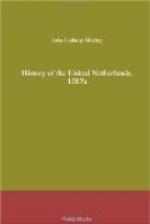The state-council had written concerning these rumours to Roland York, but the patient man had replied in a manner which Wilkes characterized as “unfit to have been given to such as were the executors of the Earl of Leicester’s authority.” The councillor implored the governor-general accordingly to send some speedy direction in this matter, as well to Roland York as to Sir William Stanley; for he explicitly and earnestly warned him, that those personages would pay no heed to the remonstrances of the state-council.
Thus again and again was Leicester—on whose head rested, by his own deliberate act, the whole responsibility—forewarned that some great mischief was impending. There was time enough even then—for it was but the 16th December—to place full powers in the hands of the state-council, of Norris, or of Hohenlo, and secretly and swiftly to secure the suspected persons, and avert the danger. Leicester did nothing. How could he acknowledge his error? How could he manifest confidence in the detested Norris? How appeal to the violent and deeply incensed Hohenlo?
Three weeks more rolled by, and the much-enduring Roland York was still in confidential correspondence with Leicester and Walsingham, although his social intercourse with the Spanish governor of Zutphen continued to be upon the most liberal and agreeable footing. He was not quite satisfied with the general, aspect of the Queen’s cause in the Netherlands, and wrote to the Secretary of State in a tone of despondency, and mild expostulation. Walsingham would have been less edified by these communications, had he been aware that York, upon first entering Leicester’s service, had immediately opened a correspondence with the Duke of Parma, and had secretly given him to understand that his object was to serve the cause of Spain. This was indeed the fact, as the Duke informed the King, “but then he is such a scatter-brained, reckless dare-devil,” said Parma, “that I hardly expected much of him.” Thus the astute Sir Francis had been outwitted, by the adventurous Roland, who was perhaps destined also to surpass the anticipations of the Spanish commander-in-chief.
Meantime York informed his English patrons, on the 7th January, that matters were not proceeding so smoothly in the political world as he could wish. He had found “many cross and indirect proceedings,” and so, according to Lord Leicester’s desire, he sent him a “discourse” on the subject, which he begged Sir Francis to “peruse, add to, or take away from,” and then to inclose to the Earl. He hoped he should be forgiven if the style of the production was not quite satisfactory; for, said he, “the place where I am doth too much torment my memory, to call every point to my remembrance.”




